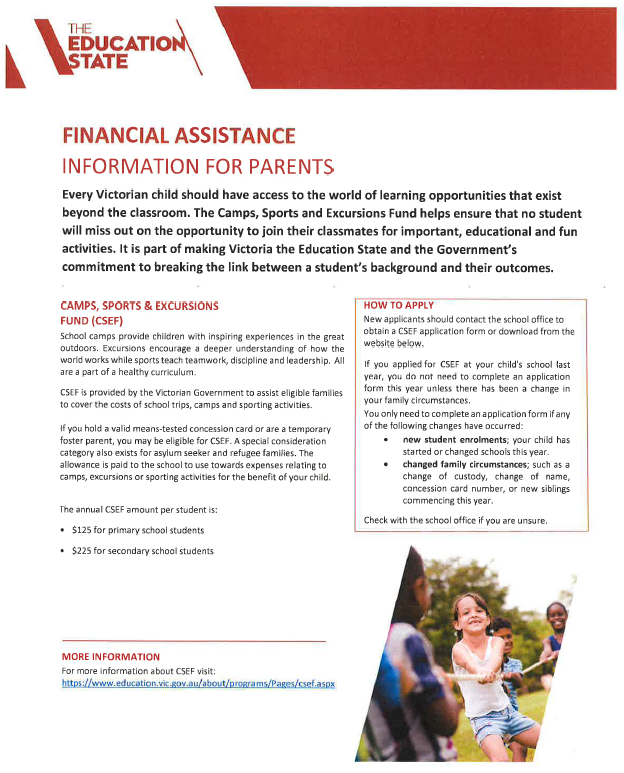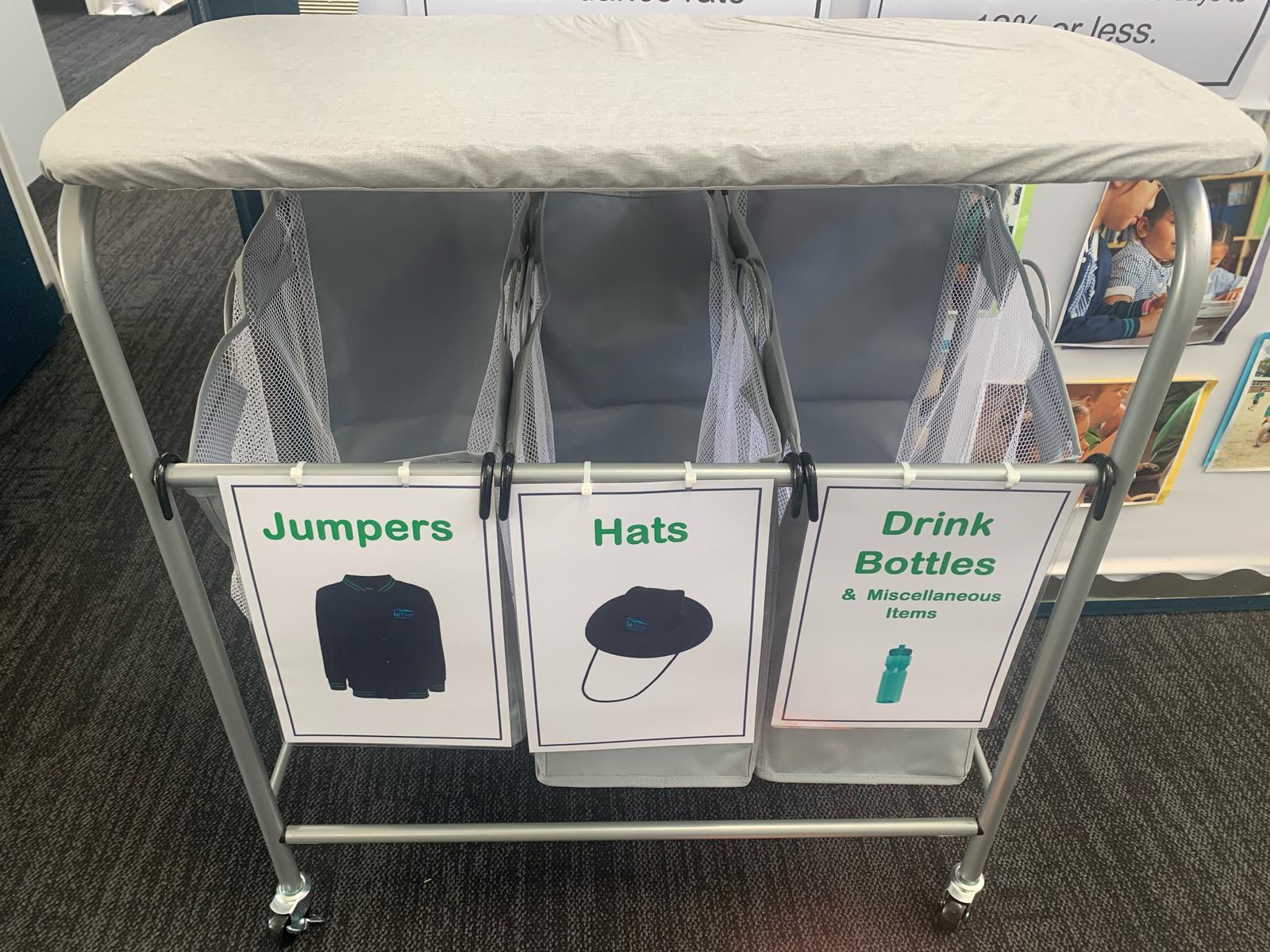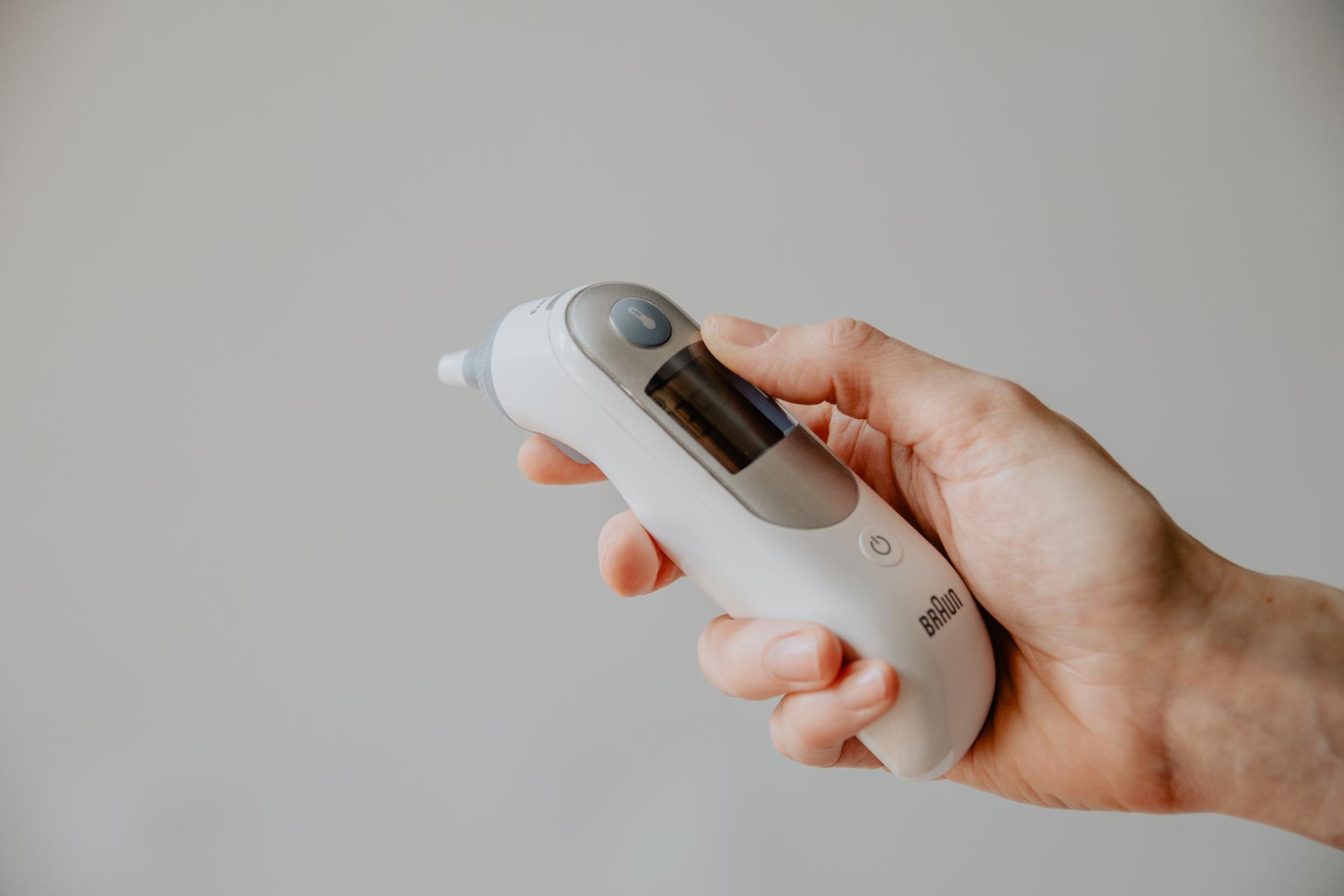From the front desk
a note from Heather and Brooke

From the front desk
a note from Heather and Brooke


We would like to welcome our newest family to our school - The Sparrius Family.
Julia joined our 3/4 class.
Welcome Julia 😊
School Holiday Program
Two weeks of epic fun with friends awaits these April school holidays! We will be sharing our rich cultural diversity, getting bodies and minds moving, dreaming big for the future, exploring the world of science and so much more. Join us at Kingston School Holiday Programs by clicking on the brochure
Camps, Sports and Excursions Fund - CSEF


To be eligible for this fund, a parent or legal guardian must on the first day of term one or two be a holder of a Centrelink Health Care Card, a Pensioner Concession Card, or be a temporary foster parent. The rate for this fund is $125.00 per year for a primary school student. Funds are paid directly to the school, to be allocated by the school, towards camps, sports and/or excursion costs. The application form is available at the school office. If you require further information regarding this fund contact Heather.
Lost Property 🧥👔👗🧦
We have 2 new lost property hampers located in the main building and in the BER (Library end). Please make sure you check these regularly for any missing items.




Unwell students at school - 😷
Unfortunately our students get unwell from time to time and we need to send them home from school. If we could please ask that all students who have been unwell ( Vomiting/Loose bowel) to please stay home for the 24 hour period as directed by the Victorian Government. We know this can be hard for families to manage at times with work commitments, but it is important to help stop the spread of germs and sickness at school.


| Minimum period of exclusion from primary schools and children’s services[1] for infectious diseases cases and contacts |
| Public Health and Wellbeing Regulations 2019 |
Schedule 7
Column 1 Number | Column 2 Conditions | Column 3 Exclusion of cases | Column 4 Exclusion of Contacts |
|---|---|---|---|
| Chickenpox | Exclude until all blisters have dried. This is usually at least 5 days after the rash appears in unimmunised children, but may be less in previously immunised children | Any child with an immune deficiency (for example, leukaemia) or receiving chemotherapy should be excluded for their own protection. Otherwise not excluded | |
| Conjunctivitis | Exclude until discharge from eyes has ceased | Not excluded | |
| Cytomegalovirus (CMV) infection | Exclusion is not necessary | Not excluded | |
| Diarrhoeal illness* | Exclude until there has not been vomiting or a loose bowel motion for 24 hours | Not excluded | |
| Diphtheria | Exclude until medical certificate of recovery is received following at least two negative throat swabs, the first not less than 24 hours after finishing a course of antibiotics and the other 48 hours later | Exclude family/household contacts until cleared to return by the Chief Health Officer | |
Glandular fever (Epstein-Barr Virus infection) | Exclusion is not necessary | Not excluded | |
| Hand, Foot and Mouth disease | Exclude until all blisters have dried | Not excluded | |
| Haemophilus influenzae type b (Hib) | Exclude until 48 hours after initiation of effective therapy | Not excluded | |
| Hepatitis A | Exclude until a medical certificate of recovery is received, but not before 7 days after the onset of jaundice or illness | Not excluded | |
| Hepatitis B | Exclusion is not necessary | Not excluded | |
| Hepatitis C | Exclusion is not necessary | Not excluded | |
| Herpes (cold sores) | Young children unable to comply with good hygiene practices should be excluded while the lesion is weeping. Lesions to be covered by dressing, where possible | Not excluded | |
| Human immuno-deficiency virus infection (HIV) | Exclusion is not necessary | Not excluded | |
| Impetigo | Exclude until appropriate treatment has commenced. Sores on exposed surfaces must be covered with a watertight dressing | Not excluded | |
| Influenza and influenza like illnesses | Exclude until well | Not excluded unless considered necessary by the Chief Health Officer | |
| Leprosy | Exclude until approval to return has been given by the Chief Health Officer | Not excluded | |
| Measles | Exclude for at least 4 days after onset of rash | Immunised contacts not excluded. Unimmunised contacts should be excluded until 14 days after the first day of appearance of rash in the last case. If unimmunised contacts are vaccinated within 72 hours of exposure with any infectious case, or received Normal Human Immunoglobulin (NHIG) within 144 hours of exposure of any infectious case, they may return to the facility | |
| Meningitis (bacterial —other than meningococcal meningitis) | Exclude until well | Not excluded | |
| Meningococcal infection | Exclude until adequate carrier eradication therapy has been completed | Not excluded if receiving carrier eradication therapy | |
| Mumps | Exclude for 5 days or until swelling goes down (whichever is sooner) | Not excluded | |
| Molluscum contagiosum | Exclusion is not necessary | Not excluded | |
| Pertussis (Whooping cough) | Exclude the child for 21 days after the onset of cough or until they have completed 5 days of a course of antibiotic treatment | Contacts aged less than 7 years in the same room as the case who have not received three effective doses of pertussis vaccine should be excluded for 14 days after the last exposure to the infectious case, or until they have taken 5 days of a course of effective antibiotic treatment | |
| Poliovirus infection | Exclude for at least 14 days from onset. Re‑admit after receiving medical certificate of recovery | Not excluded | |
| Ringworm, scabies, pediculosis (head lice) | Exclude until the day after appropriate treatment has commenced | Not excluded | |
| Rubella (German measles) | Exclude until fully recovered or for at least four days after the onset of rash | Not excluded | |
| Severe Acute Respiratory Syndrome (SARS) | Exclude until medical certificate of recovery is produced | Not excluded unless considered necessary by the Chief Health Officer | |
| Shiga toxin or Verotoxin producing Escherichia coli (STEC or VTEC) | Exclude if required by the Chief Health Officer and only for the period specified by the Chief Health Officer | Not excluded | |
| Streptococcal infection (including scarlet fever) | Exclude until the child has received antibiotic treatment for at least 24 hours and the child feels well | Not excluded | |
| Tuberculosis (excluding latent tuberculosis) | Exclude until receipt of a medical certificate from the treating physician stating that the child is not considered to be infectious | Not excluded | |
| Typhoid fever (including paratyphoid fever) | Exclude until approval to return has been given by the Chief Health Officer | Not excluded unless considered necessary by the Chief Health Officer |
A person in charge of a primary school, education and care service premises or children’s services centre must not allow a child to attend the primary school, education and care service premises or children’s services centre for the period or in the circumstances:* specified in column 3 of the Table in Schedule 7 if the person in charge has been informed that the child is infected with an infectious disease listed in column 2 of that Table; or* specified in column 4 of the Table in Schedule 7 if the person in charge has been informed that the child has been in contact with a person who is infected with an infectious disease listed in column 2 of that Table.
*Diarrhoeal illness includes instances where certain pathogens are identified including Amebiasis (Entamoeba histolytica), Campylobacter spp., Salmonella spp., Shigella spp. and intestinal worms, but is not limited to infection with these pathogens.
Please contact the Communicable Disease Prevention and Control Section on 1300 651 160 or visit
www2.health.vic.gov.au/public-health/infectious-diseases/school-exclusion
[1] Children’s services cover the terms ‘education and care service premises’ or ‘children’s services centre’ used in the regulations. It includes centres such as childcare centres and kindergartens.
A Letter from Victoria's Chief Health Officer
Term 1 is now fully in swing for 2021, which makes it even more important for every Victorian to play their part to help prevent the spread of COVID-19. We all want Victoria to continue to stay safe and stay open and we want our children to continue to learn at their school, kindergarten or other early childhood education centre.
Recently, we’ve seen some cases of COVID-19 emerge. The Department of Health is doing everything it can to prevent spreading in the community through locating close contacts, continued testing and wastewater monitoring.
Early childhood centres and schools have comprehensive COVIDSafe plans in place. This means that schools and centres have embedded the behaviours we learned in 2020 and are well placed to act quickly and respond to any identified risks. I am confident this is reassuring to families, children and staff. However, the importance of all Victorians remaining vigilant cannot be stressed enough. It is vital that we all continue to stay home when unwell, get tested, perform regular hand hygiene, and cough into your elbow if you have to. I remind all staff, students, parents and families to wear a face mask when required and stay at least 1.5m apart from others when practical.
I also encourage you to promote and ensure testing whenever a child or staff member has any symptoms, no matter how mild. Getting tested and staying home until results are known remains critical to limiting the spread of COVID-19. It is also important to get tested when it is recommended, for example, if you have visited an exposure site.
Continued vigilance to prevent the spread of COVID-19 ensures that schools and early childhood education centres remain safe for students and staff.
Victorian Chief Health Officer
Facebook 👍


Just a reminder to follow us on Facebook!!
www.facebook.com/lepageprimaryschool

